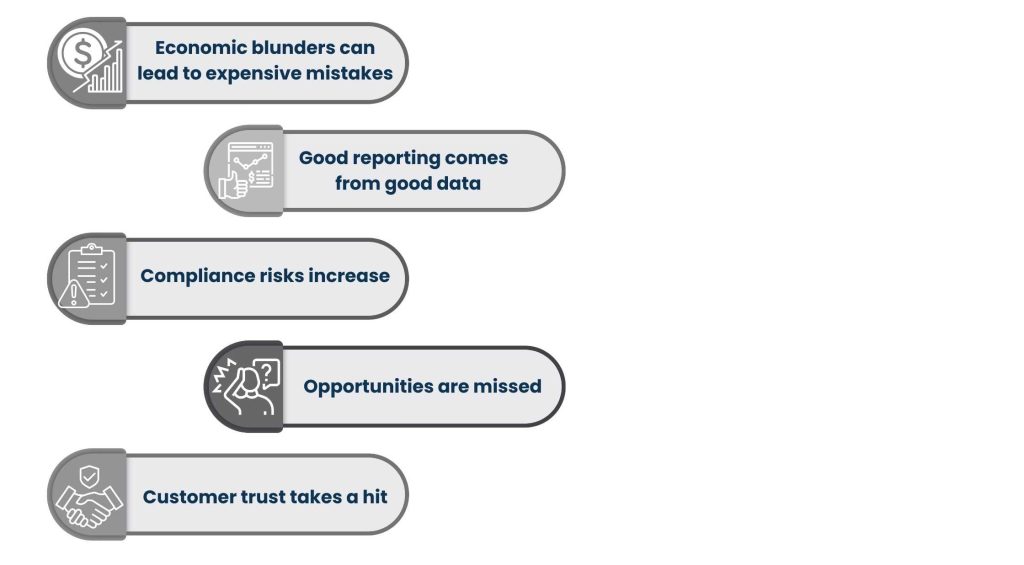Introduction
Collecting information is not enough in a highly competitive world— we have to ensure that information is correct, current, and prepared for action. Behind many of the numbers that fuel financial reports, medical records, and even online sales platforms is a person working in the background to make everything run smoothly: the Data Entry Analyst.
Data Entry Analysts are the unsung heroes of business operations, often overlooked yet never missed. They help keep systems clean, ensure processes are compliant, and equip teams with the right data to make sound decisions. When validating invoice records in finance, updating patient data in healthcare, or managing product details in e-commerce, accuracy and speed are not optional. They’re essential.
In this blog, we will break down what Data Entry Analysts do, why their role matters in many industries, and how putting the right people in this position can reduce risk, save time, and drive directly to the bottom line.
What Is A Data Entry Analyst And What Is It They Do?
Data Entry Analysts do more than type fast — they are responsible for putting, updating, and verifying crucial business data to perfection. Their work demands concentration, consistency, and attention to detail, particularly in fields where errors carry actual financial, legal, or customer-related ramifications.

Here’s what their job typically entails:
1. Entering and updating records: Data entry analysts record new and existing records accurately and uniformly, whether those records are transactions, medical forms, customer details, or stock lists.
2. Checking data: They validate incoming data against systems already in place to prevent duplication and errors a critical task when significant quantities of data are involved or when syncing between tools.
3. Cleaning and formatting: They ensure all data is formatted to consistent standards, which is essential for reporting, automation, and integration across platforms.
4. Spotting discrepancies: If something seems off — payment not matching an amount on a bill or a patient record appearing twice — they raise the alarm, stopping small problems from escalating.
5. Interfacing with databases, CRMs, and ERPs: Analysts often work within systems like Salesforce, Excel, SAP, or healthcare EMR platforms to maintain a flow of data across teams.
They’re not merely data entry, they’re the quality control layer between your biz systems and your operations.
Also Read: Virtual Assistant Services in Helsingborg
Why Accuracy and Speed are Essential in All Industries?
No matter if you are in finance, healthcare, or retail, if you and your team are using outdated, inconsistent, or simply wrong data, your decisions will mirror that.

Here’s why you can’t afford to treat data entry as “busy work” — it’s business-critical:
1. Economic blunders can lead to expensive mistakes: A single digit typed or transposed incorrectly on an invoice or expense report can throw off financial statements and set off compliance alarms.
2. Good reporting comes from good data: Dashboards and analytics tools need data to work, and the data only needs information to work. If the data is slow or inconsistent, your reports are useless.
3. Compliance risks increase: In healthcare and finance, especially, statically entered data in the wrong field can create audit problems, legal exposure, or fines.
4. Opportunities are missed: A lead can go cold if your CRM does not update in real-time. Outdated product details can prompt customers to check out a competitor.
5. Customer trust takes a hit: Errors in customer records, billing, or communication only lead to frustration and tarnish your brand’s identity.
That’s why talented Data Entry Analysts aren’t merely a support role, they’re an insurance policy for performance, compliance, and customer satisfaction.
But before we get into how Data Entry Analysts assist sectors such as healthcare, retail, or finance, it’s vital to recognize one key factor about this skill: Although their central skill is speed, accuracy, and consistency, the way those skills are utilized is highly dependent on the industry.
Each of these sectors has its systems, regulations, and operational pressure points. A typo in a financial spreadsheet doesn’t have the same track as an error in a patient record. But it can affect the business just the same.
This is how Data Entry Analysts make an impact in the top three industries.
How Data Entry Analysts Help the Finance Industry
In finance, accuracy isn’t just preferred — it’s mandatory. Every digit punched impacts cash flow tracking, audits, compliance, and forecasting. Data Entry Analysts are key to keeping those financial systems clean and efficient.

💸 Source and Validate Transaction Information
Transaction data from receipts, invoices, and banking feeds is painstakingly input by analysts. They check inputs for consistency, flag deviations, and authenticate supporting documents. This guarantees accurate financial records that are also audit-ready without any duplicate or missing entries.
🧾 Client Records Updates and Verification
A misspelling or outdated billing detail can slow down payments or cause compliance problems. Data Entry Analysts routinely verify client records to keep contact, tax, and financial information up to date. This increases efficient billing and protects client trust.
🔄 Cross-system Data Reconciliation
Reporting errors may arise from discrepancies present between platforms (e.g., Excel vs. QuickBooks, bank vs ERP, etc.). Analysts check the entries against different tools and matches/ balances, identify mismatches, and collaborate with the respective teams to resolve them quickly. Their work helps enable accurate reporting and an efficient month-end close.
📑 Helping in Drafting Compliance Documents
Regulated industries require clean, traceable financial data, which starts with data entry. They help keep an audit trail, archive important files, and maintain reports in line with compliance standards. Their precision is why organizations can sail through audits without late-night spikes of dread.
📊 Assisting with Audit Readiness
In internal or external audits, Analysts know the data and how it was written down. They pull transaction histories, organize documents and assist auditors in navigating systems quickly. This minimizes downtime and instills confidence in financial reporting.
How Data Entry Analysts Ensure Smooth Operations in Healthcare
In healthcare, even small data errors can impact patient safety, treatment deadlines, or legal risk. The quality of patient information is the responsibility of Data Entry Analysts, who are required to support care providers, billing teams, and admin staff.

📝 Processing Patient Intake Forms
Every patient submits forms with vital information, demographics, history, allergies, and insurance before care can begin. Analysts rapidly and accurately enter this data in EMRs. Their speed also minimizes wait times, and their accuracy offers the clinicians what they need at the outset.
🏥 Changes to EMRs and Treatment Records
When care advances, analysts update the files with new diagnoses, prescriptions, and lab results. This helps continuity of care so that every nurse or doctor, or specialist sees the same, up-to-the-minute information. Incorrect or delayed updates can disrupt treatment and create confusion.
💡 Insurance Coding and Claims Assistance
Medical billing is an exacting process. Staff members trained to do this help enter standardized treatment and diagnosis codes, check patients’ insurance information, and help ensure that claims get submitted correctly. This decreases claim rejections and facilitates faster payment to providers.
🔐 Sensitive Data Handling in Compliance with HIPAA
Every record they work with is confidential, and analysts adhere to rigorous protocols to avoid breaches. Never-ending data Protection: Password-protected files, secure logins, and access control protect patient data. Their focus on compliance minimizes legal risk for healthcare organizations.
🔁 The Follow-Up: Assisting Cross-Department Communication
When different departments depend on shared data, such as lab results or medication logs, consistency is vital. Analysts bridge the gap, ensuring data is only updated in one place and the changes are reflected across systems. This optimizes communication and makes patient-centered care more efficient.
Also Read: Virtual Assistant Services in Jönköping
How Data-Entry Analysts Keep Healthcare Operations Moving
In health care, errors can have costs beyond financial — they can affect patient safety. And that’s why Data Entry Analysts in medical settings enhance their work with precision, sensitivity, and a sound understanding of regulations such as HIPAA. They are solving problems for doctors, nurses, billing teams, and patient services directly — building a seamless, accurate, and compliant flow of data throughout the organization.

Here’s what being a data scientist looks like:
📝 How to process Patient Intake Forms
Every visit begins with forms — personal info, medical history, insurance information, allergies, medications. Data Entry Analysts enter this information efficiently and accurately into EMR (Electronic Medical Record) systems. Any missing or wrong details can result in wrong treatment or a delay in diagnosis. They enter and validate this data quickly, making sure doctors have real-time, accurate information before a patient even enters the examination room.
🏥 EMR (Electronic Medical Record) Updating and Treatment Records
Health care is fluid — test results arrive, medications change, and treatment plans adjust. As this information changes, it is the analyst’s job to keep EMRs current. These updates ensure that one department’s patient records sync up with other departments and care providers, enabling seamless handoffs between doctors, labs, and pharmacists. Without these updates, providers are at risk of basing care on outdated data that can impair patient care.
💡 Coding & Claims Support for Insurance
Healthcare billing is based on coding accuracy — CPT, ICD-10, and HCPCS codes used must accurately reflect the services performed. Data Entry Analysts assist with entering the correct codes and verifying insurance information. They decrease billing errors and cut claim rejections, accelerating reimbursements. These measures not only help medical practices maintain a steady cash flow but also minimize frustration for the patient.
🔐 Processing Sensitive Data with HIPAA Compliance
There’s no compromise on patient confidentiality. How analysts handle or have access to records — from how they store files to how they “cross” data between systems — requires adherence to stringent data security policies. It is less prone to data breaches and guarantees that the healthcare provider is compliant with HIPAA and other privacy regulations.
🔁 Assisting Inter-Department Collaboration
In hospitals and clinics, attached departments such as radiology, pharmacy , and outpatient care depend on a common understanding of each patient’s history. Data Entry Analysts update these records cross-platform. This coordination prevents duplicate tests, ensures timely follow-ups, and removes the confusion that can compromise patient satisfaction and, ultimately, patient safety.
In short, healthcare Data Entry Analysts handle much more than the admin work — they are a key connection in providing timely, coordinated, and compliant patient care.
How Data-Entry Analysts Ensure Smooth Operations for E-commerce
In the realm of e-commerce, speed, accuracy, and real-time updates are mandatory. Whether you are managing thousands of SKUs, processing hundreds of orders a day, or simply keeping customer records fresh, Data Entry Analysts form the backbone of what makes the system functional and scalable.

Here’s a breakdown of how they boost growing e-commerce operations:
🛒 Updating Product Catalogs
Analysts enter and manage product information such as pricing, descriptions, sizes, images, and stock quantities on multiple platforms (Shopify, Magento, Amazon, etc.). They keep listings updated and accurate. One mistake — such as the price being wrong or an out-of-stock item appearing as available — can lead to refunds, customer complaints, or lost sales.
📦 The Order and Return Process
They check and enter the sales order details to ensure the goods get shipped on time and accurately. For returns, they handle restocking logs, reasons for returns, and communication with customers — minimizing delays and helping support teams stay organized.
🔄 Keep CRM and Order Platforms in Sync
CRMs, email marketing tools, and even order systems can get out of sync, and Data Entry Analysts help keep them in sync. Say a customer’s email or shipping address changes, for example; analysts ensure that it gets updated everywhere, avoiding errors in fulfillment or communication.
👩💻 Managing Customer Data
What do you get from clean customer records? Quality support and robust marketing. Analysts fix duplicate entries, standardize format, and flag inactive or invalid contacts. This enhances segmentation, and targeting and helps in customizing the buying experience.
📈 Assisting in Seasonal and High-Volume Periods
Data volumes surge during holidays or product launches. Entry analysts carry the load — adding products, updating promotions, tracking orders — without missing a beat. What it does provide is agility and ensures that customers still receive accurate and extremely quick service even during peak hours.
Also Read: Virtual Assistant Services in Malmo
The Danger of Bad Data Entry And the Price of Making a Mistake
In virtually every industry, the cost of good data gone bad is accumulating and fast. And the most damaging part? These issues often start small, insidiously making their way in under the radar until the negativity compounds
In finance, a rogue digit can result in budget blindness, false filings, or noncompliance. A couple of missed decimals or a wrong account code can derail whole forecasts or create regulatory problems. Even minor mistakes can take hours to diagnose and correct wasting precious resources and diverting your team away from higher-value tasks like strategic planning or investor reporting.
In healthcare, outdated information about a patient could slow treatment or lead to misdiagnosis. A simple data mismatch could lead to a duplication of tests, the wrong prescription being given, or patient records being mixed up, among other things. Mistakes in billing codes can also lead to insurance claims being denied, stalling cash flow, and frustrating both staff and patients.
When data fails, everything fed by it forecasting, fulfillment, billing, reporting fails, too. What can seem like a routine admin error can result in serious operational breakdowns, revenue loss, or compliance risk.
This is why Data Entry Analysts don’t simply “do admin” they directly mitigate business risk, enable operational stability, and uphold the integrity of your data across every team.
Our back office team cleans your data, keeps your systems working, and ensures your operation runs smoothly, all so that your core team doesn’t get tied up with monotonous admin work.

Whether you need help with:
- Uploading and verifying financial transactions.
- Industrial-strength technology to manage thousands of SKUs.
- Synchronization of CRM and billing systems.
- Cleaning up spreadsheets or migrating data into platforms.
- Assisting in documentation and compliance reporting.
You have the support to help you be efficient without sacrificing quality.
And because our analysts follow industry-specific norms (HIPAA for healthcare, tax ID compliance for finance), you can rest assured that your data is handled correctly every time.
Conclusion
In high-stakes industries, poor data isn’t simply an annoyance it’s costly. The adverse impact of poor data quality slows down teams, creates risk, and undermines customer trust from delayed patient records to billing errors.
Data Entry Analysts prevent that problem from even happening. They’re the people behind the integrity operating quietly, regularly, and with the focus your business requires to grow reliably.
Ensuring healthcare accuracy, maintaining financial integrity, ensuring e-commerce efficiency they continuously keep your systems strong, and your teams focused on what they know best.
If your internal team is stretched to capacity, or if you need a scalable solution for repeatable high-volume data work, Tasks Expert is ready to help. Because at the end of the day, clean data is more than an admin task — it’s a competitive advantage.
About Us
Tasks Expert offers top-tier virtual assistant services from highly skilled professionals based in India. Our VAs handle a wide range of tasks, from part time personal assistant to specialized services like remote it support services, professional bookkeeping service etc. Furthermore, it helps businesses worldwide streamline operations and boost productivity.
Ready to elevate your business? Book a Call and let Tasks Expert take care of the rest.









